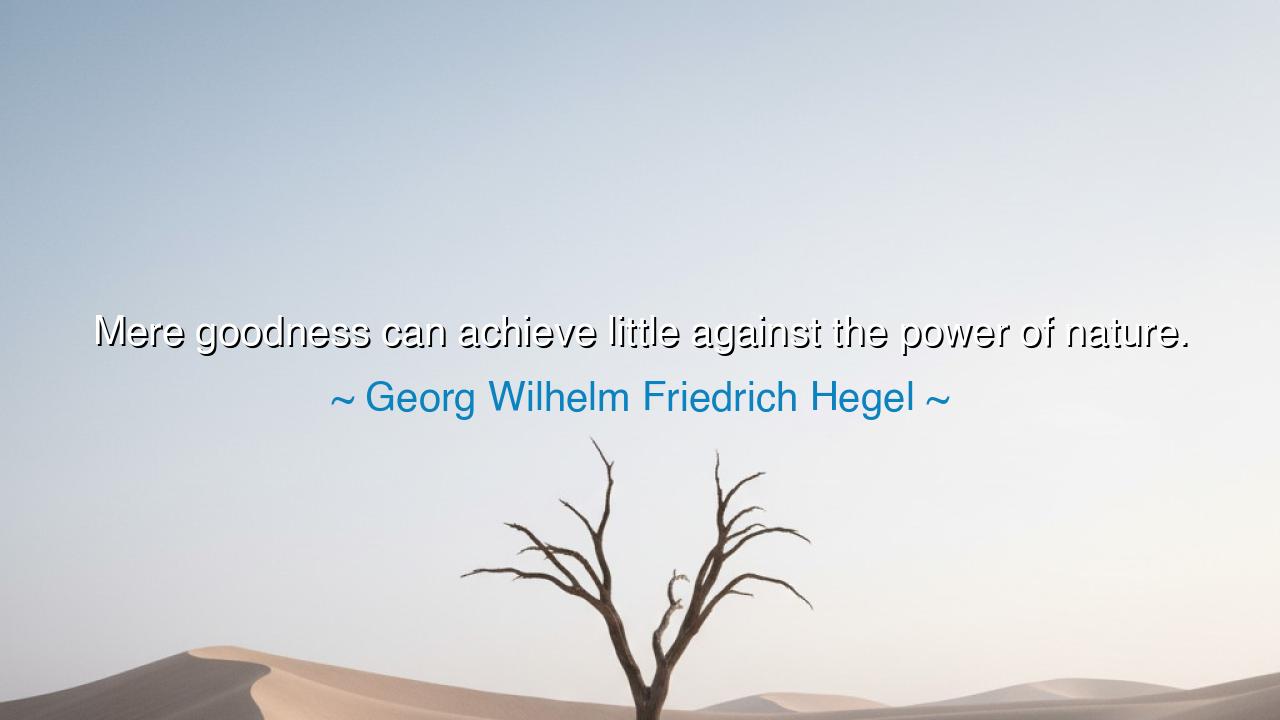
Mere goodness can achieve little against the power of nature.






Hearken, children of the ages, and attend to the words of Georg Wilhelm Friedrich Hegel, who reflected with solemn wisdom upon the limits of virtue: "Mere goodness can achieve little against the power of nature." Herein lies a meditation upon the vast, indifferent forces that shape the world, and the recognition that moral virtue, though noble, is insufficient to command or subdue the elemental powers of the earth. Hegel’s insight teaches that the human spirit, while capable of wisdom and goodness, must also reckon with the unyielding realities of natural law.
In these words, goodness represents the moral and ethical striving of the human heart—the impulse to act rightly, to help, to nurture, and to preserve. Yet even the most virtuous intentions cannot halt the eruption of a volcano, the sweep of a hurricane, or the inexorable flow of rivers that carve valleys and reshape landscapes. Nature operates according to forces older and mightier than conscience, will, or even collective human action. Hegel warns that nobility alone does not suffice to master the material world.
Consider the historical example of the 2004 Indian Ocean tsunami, which claimed over 230,000 lives across fourteen countries. Communities filled with individuals of immense courage, generosity, and goodness—fishermen, teachers, neighbors—could do little to avert the devastation. The natural power of the ocean, swift and merciless, humbled human virtue, demonstrating Hegel’s truth: morality cannot override the overwhelming and impartial forces of nature.
Hegel’s reflection also underscores the necessity of wisdom and preparedness. Goodness is the foundation of character and society, yet it must be accompanied by knowledge, foresight, and action attuned to reality. Engineers, planners, and communities who respect the power of rivers, volcanoes, and storms can mitigate harm, saving lives where mere goodwill alone would fail. Thus, Hegel calls for a marriage of virtue and understanding, of moral will and practical intelligence.
The phrase further teaches that humility is essential in the face of nature’s dominion. The virtuous heart must recognize its limits, acknowledging that human ideals, though lofty, are bounded by circumstance and the laws of the physical world. This recognition is not despair, but clarity: it is the awareness that virtue is most effective when exercised in harmony with reality, not in opposition to it.
Historical leaders such as Abraham Lincoln exemplified this principle. During the American Civil War, his sense of justice, morality, and goodness guided decisions, yet he also had to contend with the harsh realities of conflict, scarcity, and human frailty. Virtue alone could not preserve the Union; it required strategic insight, practical judgment, and comprehension of forces larger than moral aspiration. Hegel’s teaching resonates in such lives: goodness must meet circumstance to effect change.
The lesson is profound: cultivate goodness, but temper it with understanding of the forces beyond control. Recognize that moral aspiration alone does not bend storms, earthquakes, or the relentless march of natural law. To live wisely is to harmonize virtue with knowledge, intention with preparation, and heart with discernment. Only then can goodness achieve its fullest expression, not in illusionary triumph over nature, but in measured, effective engagement with the world.
Practical action follows naturally: respect the power of nature in your decisions, prepare thoughtfully for its challenges, and combine moral action with insight, skill, and strategy. Build resilience in your community, honor the natural laws that govern your surroundings, and seek to act with virtue in ways that align with reality. Hegel’s wisdom calls us to temper goodness with prudence, ensuring that our noble efforts endure against the enduring power of the earth.
Thus, Georg Wilhelm Friedrich Hegel’s words endure as both caution and counsel: mere goodness cannot bend the might of nature, yet when coupled with knowledge, preparation, and humility, it becomes a force capable of protecting, sustaining, and harmonizing life in a world of immense and unyielding power.
If you wish, I can also craft a poetic, audio-ready version of this passage, where the cadence mirrors the inexorable rhythms of natural forces, enhancing the emotional and reflective weight of Hegel’s insight. Do you want me to do that?






AAdministratorAdministrator
Welcome, honored guests. Please leave a comment, we will respond soon